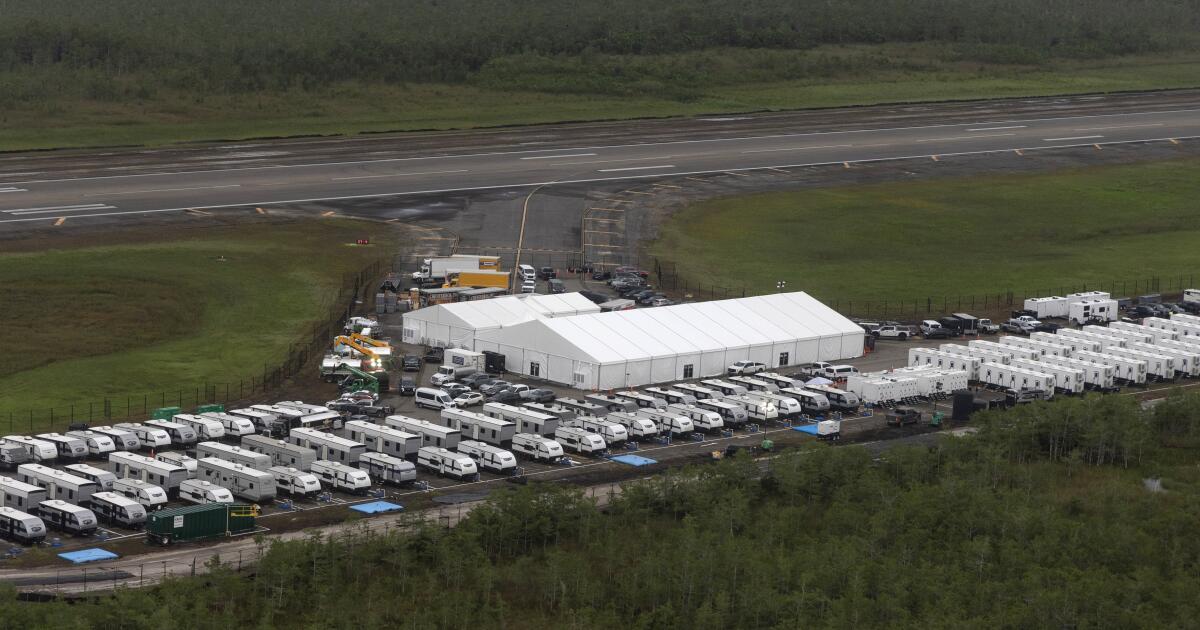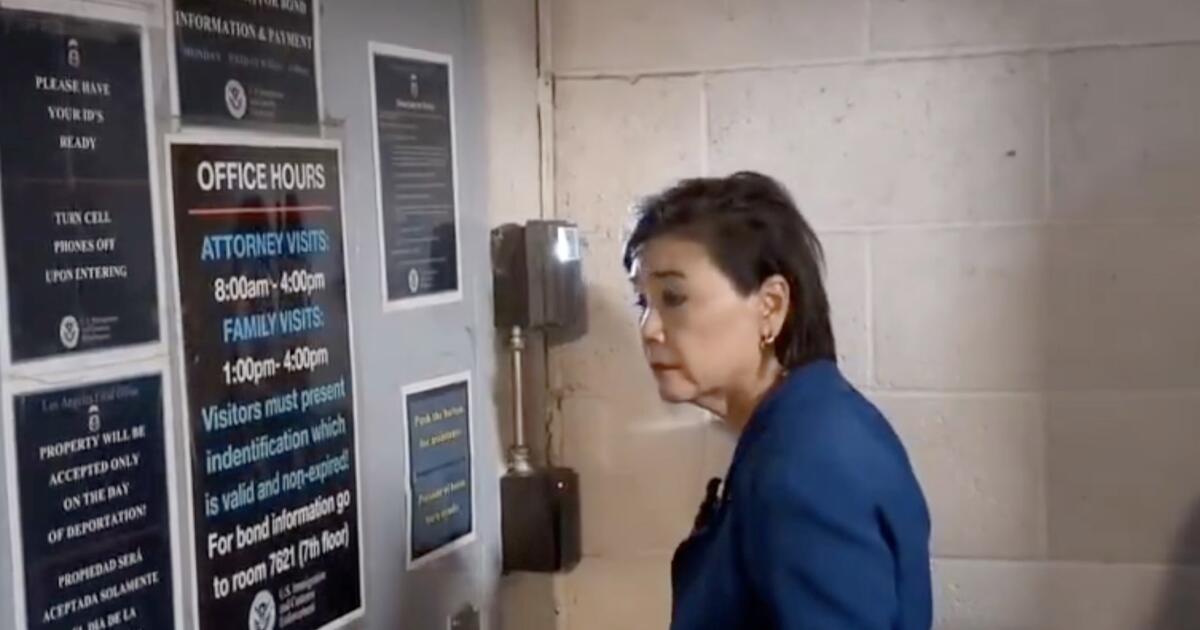Contributor: Alligator Alcatraz, the concentration camp in Florida, is a national disgrace
The first detainees have started arriving at Alligator Alcatraz, Florida’s immigrant detention center in the Everglades. The facility went up on a former airstrip in eight days and will have an initial capacity of 3,000 detainees. Florida’s Republican state Atty. Gen. James Uthmeier, the driving force behind the project, posted on X recently that the center “will be checking in hundreds of criminal illegal aliens tonight. Next stop: back to where they came from.”
Alligator Alcatraz — the camp’s official name — raises logistical, legal and humanitarian concerns. It appears intentionally designed to inflict suffering on detainees, and to allow Florida politicians to exploit migrant pain for political gain. Some of the first people held there have already reported inhumane conditions.
“Alligator Alcatraz” is a misnomer. Alcatraz was home to dangerous criminals, including Al Capone and George “Machine Gun” Kelly. These were violent offenders who had been tried and convicted and sent to the forbidding island fortress.
In contrast, we don’t know whether detainees sent to Alligator Alcatraz will have had their day in court. We don’t know whether they will receive due process in immigration courts or be charged with a crime. We do know that the majority of people whom Immigration and Customs Enforcement is arresting have no criminal records. Remember, simply being in the U.S. without authorization is not a crime — it is a civil infraction. And the ranks of the undocumented include many people who once had lawful status, such as people who overstayed their visas and people with temporary protected status and other forms of humanitarian relief that the current administration has rescinded. Transactional Records Access Clearinghouse, a research center, reports that 71% of immigrant detainees have no criminal record.
In Florida, ICE has arrested an evangelical pastor, a mother of a newborn and a U.S. citizen. These are the kinds of people who might end up spending time in Alligator Alcatraz. In fact, Florida state documents show that detainees there could include women, children and the elderly.
Alligator Alcatraz will place detainees in life-threatening conditions. The site consists of heavy-duty tents and mobile units, in a location known for intense humidity and sweltering heat. Tropical storms, hurricanes and floods pass through the area regularly. On a day when the president visited, there was light rain and parts of the facility flooded. This is not a safe place for the support staff who will be working there, nor is it for detainees.
Florida Gov. Ron DeSantis has praised the “natural” security at Alligator Alcatraz as “amazing.” When asked if the idea was for detainees to get eaten by alligators if they try to escape, President Trump replied, “I guess that’s the concept.” However, escapes from immigration detention are rare. The June escape by four men from a New Jersey detention center made headlines, in part because it was such an unusual occurrence (three of the escaped detainees are back in custody). So the construction of a detention center with a “moat” of forbidding wildlife is just performative cruelty.
Consider the gleeful ways that Florida Republicans have promoted Alligator Alcatraz. The state GOP is selling branded merchandise online, such as hats and T-shirts. On his website, the attorney general is hawking his own products, including Alligator Alcatraz buttons and bumper stickers. But immigration detention is a serious matter. It should not be treated like a cheap spectacle, with souvenirs available for purchase.
Immigrant advocacy groups are rightfully alarmed by Alligator Alcatraz. They’re not the only ones: Environmental groups have protested its impact on the surrounding ecosystem, while Indigenous tribes are angry because the camp sits near lands that are sacred to them. The author of a global history of concentration camps has concluded that Alligator Alcatraz meets the criterion for such a label.
The most troubling aspect of Alligator Alcatraz is that it may be a harbinger of things to come. The budget legislation that the president signed into law on July 4 allocates $45 billion for immigration detention over the next four years. Other states may follow Florida’s example and set up detention centers in punishing locales. This will likely happen with little oversight, as the administration has closed the offices that monitored abuse and neglect in detention facilities.
Yes, Homeland Security and ICE are mandated by law to arrest people who are in the country without authorization and to detain them pending removal. That is true no matter who is president. Yet Alligator Alcatraz is a state project, outside the normal scope of federal government accountability. On Thursday, state lawmakers who sought to inspect the facility were denied entry.
In embracing Alligator Alcatraz, the administration is testing the limits of public support for the president’s immigration agenda. According to a June Quinnipiac survey, 57% of voters disapprove of the president’s handling of immigration. A more recent YouGov poll found that Alligator Alcatraz is likewise unpopular with a plurality of Americans.
Alligator Alcatraz is not a joke. It is a dehumanizing political stunt that puts immigrant detainees at genuine risk of harm or death.
Raul A. Reyes is an immigration attorney and contributor to NBC Latino and CNN Opinion. @RaulAReyes; @raulareyes1
Insights
L.A. Times Insights delivers AI-generated analysis on Voices content to offer all points of view. Insights does not appear on any news articles.
Viewpoint
Perspectives
The following AI-generated content is powered by Perplexity. The Los Angeles Times editorial staff does not create or edit the content.
Ideas expressed in the piece
- The author argues that Alligator Alcatraz is a “concentration camp” and “national disgrace,” citing its rapid construction in an environmentally hostile Everglades location as intentionally designed to inflict suffering on detainees[1].
- He contends that the facility dehumanizes detainees, noting reports of inhumane conditions including denied bathing water and inadequate food, while emphasizing that most detainees lack criminal records and include vulnerable groups like women and children[2].
- The article criticizes Florida Republicans for treating the facility as a “cheap spectacle” by selling branded merchandise, while environmental and Indigenous groups protest its ecological impact and desecration of sacred lands[3].
- Reyes asserts that the camp sets a dangerous precedent enabled by reduced federal oversight, with $45 billion allocated for similar detention centers, and polls indicating public disapproval of both the president’s immigration policies and Alligator Alcatraz itself[4].
Different views on the topic
- Florida officials, including Governor Ron DeSantis and Attorney General James Uthmeier, defend the facility as an “effective way” to increase deportations, highlighting its rapid construction and security features like 200 cameras and 28,000 feet of barbed wire[1][4].
- President Trump endorsed the site as a “professional and well done” model for other states, suggesting the Everglades’ wildlife naturally deters escape attempts with the remark, “we’re going to teach them how to run away from an alligator”[1].
- The Justice Department intervened to prevent construction delays, signaling federal support for the facility’s legality, while state authorities deny detainees’ allegations of inhumane conditions[2][4].
- Republican lawmakers frame the center as a necessary measure for border enforcement, with Uthmeier stating detainees’ “next stop” is deportation, though Democrats demand its closure over sanitation and jurisdictional ambiguity[3].

